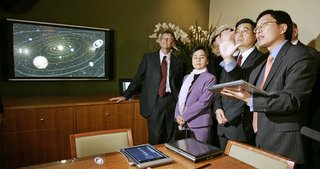
More and more, our perceptions of China are changing. Predictions of China emerging as a new world power, capable of replacing America's dominance, are not so unrealistic. They have conducted a series of policy moves in recent months, that have demonstrated to the rest of the world, that they are not going to repeat the mistakes of Japan or follow a dangerous course set by other countries like the United States. The U.S. could learn a thing or two from China and if they don't implement measures to correct serious global imbalances, they will long for the days when fiscal responsibility ruled the day.
China rate hike first in a series of measures to cool economy
Fri Apr 28, 3:37 AM ET
BEIJING (AFP) - China decision to raise interest rates for the first time in 18 months is only the first in a series of measures aimed at preventing the booming economy from overheating, analysts said.
The People's Bank of China announced Thursday the one-year benchmark lending rate would rise by 27 basis points to 5.85 percent in an effort to put a brake on credit and control the "excessively fast" release of bank loans.
"We must carefully handle the scale of credit ... strengthen capital controls and establish the principles of sustainable, stable and healthy management," central bank vice governor Wu Xiaoling said in a statement.
"We must improve financial services, effectively adjust the credit structure and strictly control excessive credit in the investment sector."
Analysts said the hike would have only a limited impact on controlling fixed asset investments, which expanded by 27.7 percent in the first quarter after rising by 25.7 percent for all of 2005, and the broader problem of overheating.
They said the government was no doubt preparing other measures in the coming months to address the issues after the economy expanded by a faster-than-expected 10.2 percent in the first quarter of the year.
"There will be a set of macro-economic measures to adjust the economy," Ning Xiangdong, an economist at the China Center for Economic Research at Tsinghua University, told AFP.
He said these would include structural adjustments as well as using credit and interest rate tools.
"The problems with China's economy are all structural in nature so structural adjustments will be made in key sectors that are overheating like steel, metals, building materials and high-end real estate projects."
In one example, China's chief economic planning body, the National Developmental Reform Commission, had already announced plans on Tuesday to target over-investment in the real estate sector.
"New projects must conform with state industrial policies and market standards, and we must prevent excessive investment in some industries and regions," the commission said in a policy paper.
Julian Jessop, chief economist for London-based Capital Economics, said the rate hike would on its own not have a major impact on cooling the economy but, as a part of expected broader economic reforms, was important.
"This step is not a big surprise. Some form of monetary tightening was widely expected after the strong first quarter data, which showed no sign that the investment boom is abating," Jessop said in a research note.
"We also think it will be the only change in this rate for a while but as part of a wider package of measures, it should help to deliver the 'soft landing' that we expect over the next few years."
Chen Xuebing, vice director at the Institute of Financial Studies at Fudan University, said another rate hike could not be ruled out.
"The move was mainly to tell people that more measures are coming but since the rate hike was so small, it won't have a big effect. If they don't have a good result from the rate hike, they will raise rates again," Chen said.
The rate hike was similarly expected to have little impact on the yuan, which is maintained in a tight band by the government and which the United States and other Western nations want to see appreciate much more strongly.
"We do not think this will have any impact on the dollar/yuan exchange rate," said Stephen Green, analyst with Standard Chartered, adding the move "will not encourage more (fund) inflows."